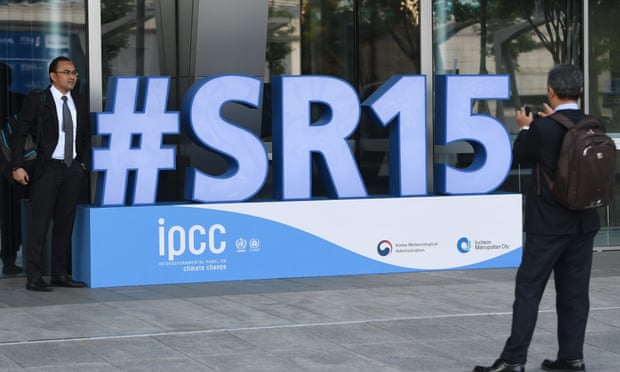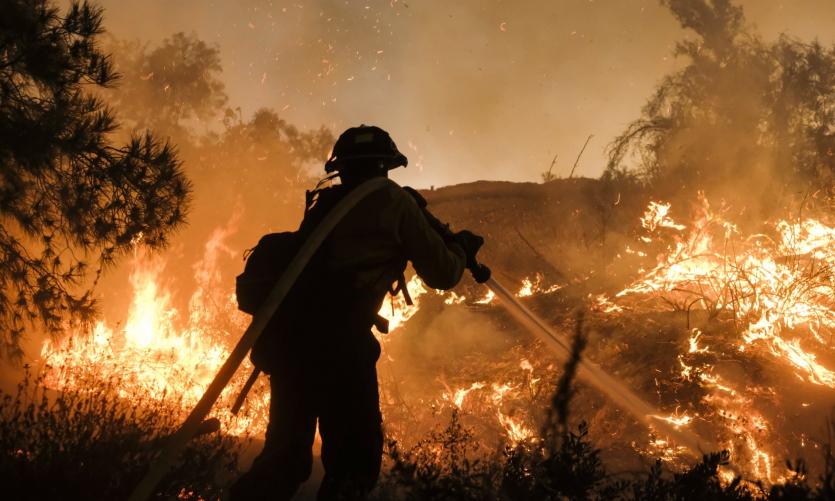A firefighter battles a fire in California. The world is currently 1C warmer than preindustrial levels. Photograph: Ringo HW Chiu/AP
 OCTOBER 9th, 2018
OCTOBER 9th, 2018
By Patryk Krych | The World Daily
12 years left to lower emissions to 1.5C, otherwise results may be disastrous, according to UN
A warning has been issued by the world’s leading climate scientists that the world has only 12 years to limit the climate temperature rises to 1.5 degree Celsius, maximum, otherwise severe consequences could be suffered unto the world, with the severity and probability of floods, droughts, and extreme weather conditions rising if that temperature is exceeded by even half of a degree, or less.
The 1.5C research had been which was started not long after approval had been granted at a final gathering of all 195 countries of the world in the city of Incheon; in South Korea. The study showed that limiting the temperature rise by only 1.5 degrees Celsius, and not half a degree more, would put great ease upon the melting ice caps of the Arctic, and would prevent to total extinction of the ocean’s corals – corals that are important for their believed production of oxygen, and storm buffering abilities, as well as their functions as large ecosystems.
UN Intergovernmental Panel on Climate Change’s (IPCC) lead authors of the report on the matter had published these findings on Monday. A co-chair of the researching group focused on the impacts, Debra Roberts, had stated; “It’s a line in the sand and what it says to our species is that this is the moment and we must act now,” knowing very well that the task would require a great demand from the Paris agreement, “This is the largest clarion bell from the science community and I hope it mobilises people and dents the mood of complacency.”
The report had already been brought up at the Paris Agreement meetings back in 2016, of course before several problems had arisen – one of them being the United States backing out of the agreement under the presidency of Donald Trump, America being the greatest producers of carbon emissions on the planet. Roberts said, however, that the half degree of difference was astonishing, and if it can be pulled off the world may be bought a substantial amount of time; “We can see there is a difference and it’s substantial.”
Several problems have been noted to possibly occur if the temperatures do in fact reach 2 degrees Celsius or more. The high temperatures experienced in the Earth’s Northern Hemisphere could get progressively hotter still, bringing an increase to deaths caused by extreme heats, especially in countries suffering from larger instances of poverty. Some crops may begin to fail as well, and become far more scarce in developing countries. This may further be a cause of fewer insects pollinating crops and plants, due to a larger probability of losing their habitats when compared to the targeted 1.5 degrees Celsius target.
The climate change has already caused heightened levels of acidity in the world’s oceans, as well as lowered levels of oxygen, which could lead to the borderline extinction of some species, and possible annihilation of others, as well as lower amounts of fishing all over the world. With the 1.5 degrees Celsius target, there is a good chance that just under 10% of the present number of corals will survive the next 12 years, but with the half degree higher difference, there is only a probability of 1% remaining by the end of the decade. As well as this, there is the threat of rising sea levels to be fearful of as well.

Attendees take a photo before the opening of the 48th session of the IPCC in Incheon. Photograph: Jung Yeon-Je/AFP/Getty Images
Another co-chair, this one on the working group on mitigation; Jim Skea, had said “We have presented governments with pretty hard choices. We have pointed out the enormous benefits of keeping to 1.5C, and also the unprecedented shift in energy systems and transport that would be needed to achieve that.”
With time running low, severe cutbacks would have to be made, involving all the countries across the world. Skea continued; “We show it can be done within laws of physics and chemistry. Then the final tick box is political will. We cannot answer that. Only our audience can – and that is the governments that receive it.”
With new recycling method discoveries, and methods of agriculturally bringing the global warming to a slowdown, from Carbon capture/storage schemes to adoption of new renewable energy procedures all coming to a dead end themselves, the involvement of all the countries in this project is becoming gradually more and more crucial.
According to a member of the Grantham Research Institute on Climate Change, by the name of Bob Ward, the report failed to mention the larger number of immigration and refugees driven by the climate change, as well as certain tipping-points that may lead the world into a state of perpetual and unalterable warming. As such, he had labelled the report accurate, yet “incredibly conservative.”
A nearly ice-free Northwest Passage in the Arctic in August 2016. Photograph: VIIRS/Suomi NPP/Nasa
By the end of the year, the report is to be presented and discussed at the next UN climate conference, to be held in Poland. At the current speed and development of things, the world is expected to reach 3 degrees Celsius of warming by the next 12 years, a result that would be far too disastrous for the imagination, let alone the reality of our planet.
With many countries still releasing high amounts of carbon emissions, even those known to be pro-Paris agreement, full involvement will be necessary. Jiang Kejun; of China’s semi-governmental Energy Research Institute, and one of the authors of the alarming report, had stated “I hope this can change the world,” in regards to the findings of course, “Two years ago, even I didn’t believe 1.5C was possible but when I look at the options I have confidence it can be done. I want to use this report to do something big in China.”
Kejun references the Chinese government’s plans, currently being drawn up still, for the year 2050, where awareness is to be widespread about the issue, and find a solution to it with greater success, “People in Beijing have never experienced so many hot days as this summer. It’s made them talk more about climate change.”
By Patryk Krych | The World Daily
©2018 THE WORLD DAILY






